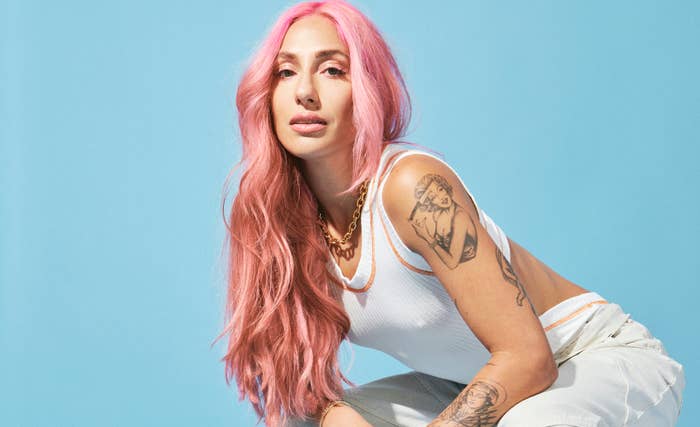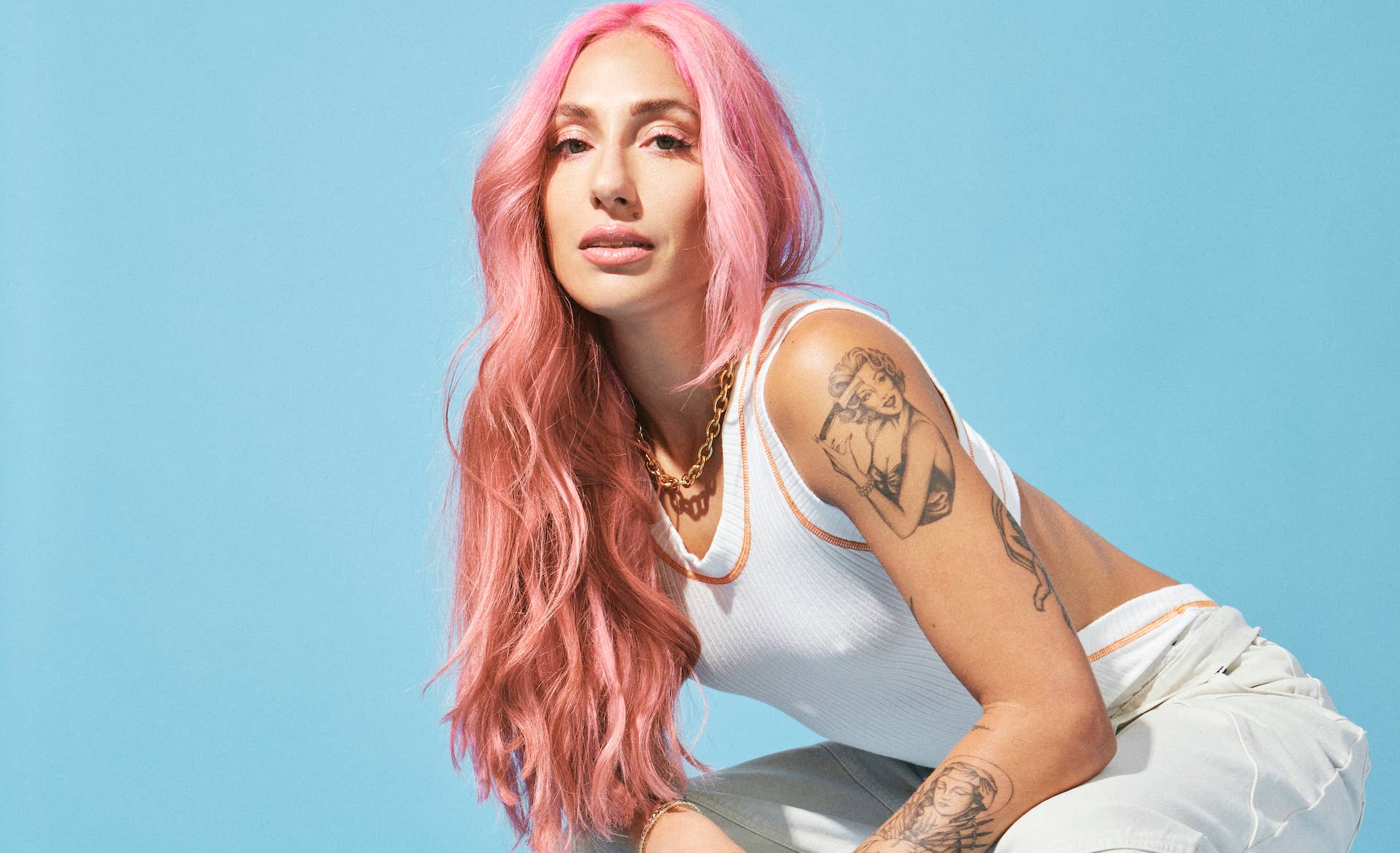
If you’re a pop culture fan with a TikTok account, chances are the algorithm has shown you one of Tefi Pessoa’s videos. The Brazilian-Colombian content creator, who grew up in Miami and goes by @hellotefi, has amassed a loyal and extensive following on the platform (1.5 million and counting) thanks to her deep, insightful knowledge of pop culture, entertainment, and celebrities.
Those are among the most popular and best-performing topics on the video platform, and Pessoa’s videos are proof of how quickly they spread and go viral. While other content creators simply regurgitate celebrity articles they find online, Pessoa stands out with the way she breaks down celebrity drama in the most meticulous, informative, and thorough way possible, while making it relatable, anecdotal, funny, and incredibly entertaining.
Her content on the platform has evolved past that, however. After noticing personal and heartfelt comments from her followers, Pessoa began using her videos and pop culture knowledge as tools for self-development. She does that by tying the latest pop culture gossip to her own and other people’s personal experiences with dating, friendships, mental health, and the ups and downs of life. Pessoa, who was recently signed by UTA, has become a wise voice that her fans turn to for advice, and now she’s taking another step further and helping her followers understand one of the most intimidating aspects of adulthood—credit scores and finances.
Pessoa is teaming up with the financial company Extra to launch Credit Talk, a weekly talk show that aims to explain all things credit and finances alongside exciting celebrity guests. The first episode features Symone, who is the winner of season 13 of RuPaul’s Drag Race, and together, they shared their experiences with money, debt, and finances—which is a topic young people, especially women, don’t usually discuss openly. “I was reading my comments and somebody said, ‘I love that you use pop culture for personal development,’ and I think that’s so on the money,” Pessoa tells Complex during a call. “Now I’m using pop culture for financial development. The idea of being able to keep up with people comes directly from pop culture. So being able to show people financial stories from people that they may admire is a game changer.”
Watching one of Pessoa’s videos feels like a judgment-free FaceTime call with one of your best friends, so she’s the perfect fit to break this down for a younger audience. Her hope is to help guide Millennials and Gen Z who are dealing with some of the most challenging times financially in terms of the cost of living, a sinking economy, student loans, maintaining a strong FICO score, and so on. To combat those challenges, Extra provides their subscribers with a debit card that connects to their bank accounts and allows them to build up their credit score and earn rewards points when they spend money, without the dangers of racking up debt. Getting into credit card debt or not having good credit often hinders people from getting approved for apartments, getting a loan, or buying a home or a car down the road, especially for those who didn’t have financial guidance at home.
These days, many people turn to social media, especially TikTok, for answers on just about anything, so an influencer like Pessoa making this type of information digestible is key. Having her on board is also helpful in reaching a demographic of young Latinxs and minorities who relate to her story and her experiences while making the topic more approachable for all. Complex caught up with Pessoa for a chat about her love for pop culture, her partnership with Extra, using her platform to help people, and the dangers of flexing on social media.

Can we talk a little bit about how you got started on TikTok and what it has done for you and your life?
I started on TikTok because I had a show on YouTube and then it got canceled because of COVID-19. It was a pop culture show so I had all this material and all these ideas, and I already had a little bit of a community and I didn’t want to lose it so I took it to TikTok. I realized that celebrities weren’t doing anything during the pandemic. I would’ve paid a Kardashian to go outside for a part of 2020, like do anything, please show me an ankle, anything. [Laughs.]
I remember I started talking about things that happened instead of things that were happening, things I lived through in dating and pop culture. In one of my first viral videos I was talking about Tom Cruise jumping on the couch, old Kanye West things, Lindsay and Paris, things that were in the news in 2005. People wanted to learn more. I realized there were a lot of kids on there. Somebody said, “Is it true that Britney Spears dated Justin Timberlake?” and I wanted to jump into traffic. I started doing stories like that.
One day I did a Brangelina series and that was the first series I did. Before that, I had been on TikTok for a year talking about pop culture stories like Rihanna dating Leonardo DiCaprio, and things like that. Then people started relating more and more and they started talking about their breakups, like, “I’m going through my first divorce,” and then people in the comments became a little community. So it started becoming not so much about the celebrity breakups but their breakups. I try to talk to teenagers in that way, that it’s not so much about obsessing over the breakup but seeing themselves in the breakup.
You’ve taken on the role of being a big sister to your followers. Does it make you nervous to share so much about your personal life or the things you have gone through?
No, because I only share things that I have already settled from, the dust has already settled, things that I have already been able to face and overcome. In my TikToks, I never talk about things I am currently going through. I always wait until there’s hindsight involved, so everything that I talk about I’m OK with. Everything has already been resolved for me and accepted for me, and absorbed.
Can you talk to me a little bit about your partnership with Extra?
Extra came in at the perfect time. I had a bank account at 16, I had a credit card when I was 18. And I’m sure that my mother tried to explain credit to me a million times but it is a complicated concept to grasp, or at least people tell you that it is. When Extra approached me with the idea of educating people on how credit works, how to build your credit, sharing stories with people about credit history and learning terms, and the language used in credit, to empower people and ensure that they don’t go into debt, I was like, “Absolutely.”
A lot of what I do online is talking to people who are either going through a hard time that I have gone through or people who are younger than me, but I’ve never had an opportunity to talk to people about financial dos and don’ts. So having that opportunity to be there for people in a way I hadn’t before, I had done the emotional relationship stuff, but being able to tell people what I learned when it comes to finances and debt is incredible.
This generation gets much of their information and knowledge from social media. Do you think it’s smart for Extra to partner with someone like you who knows how to communicate with them and makes things a little bit more understandable?
I’m not a finance professor, I’m a person who turned 18 and I made a lot of mistakes. And the good news is that I don’t know anybody that hasn’t made mistakes when it comes to credit. The credit score system has only been around since 1989. We fucked up for you and now we know what to do. It is a system where it’s meant to be confusing.
The good thing about Extra is you cannot go into debt because it’s using money that’s already in your bank account so you are automatically rebuilding your credit. Credit is the bank measuring whether or not they can trust you with a loan every month. That way you can open that business you’ve been thinking about, get that apartment, get the car, the motorcycle, even though I don’t think you should. [Laughs.]
Do you think people, because of social media, maybe feel like they have to keep up with other people and they spend a lot of money that they don’t have?
Beyond debt, something that I’ve seen a lot growing up in Miami there were a lot of parents who didn’t understand how to maneuver the computer to check their kids’ grades. So it was the kids who had to translate at school conferences or orientation, their kids had to do a lot of the translating. And I think it’s the same for credit. It took a lot of first-generation kids to explain credit.
So whether it comes from social media or being able to understand the system in place, credit is scary. We do live in a world, of course, how the fuck does everyone have a Hermès bag? I tell people Hermès is for old ladies but if you don’t think that if I could I wouldn’t have one, you’re crazy. [Laughs.] I’m a consumer through and through.
Financial literacy puts things into perspective. It’s kind of like enlightenment when it comes to anything. I compare things like going to the gym, meditation, and building your credit, it’s little things every day that can help change things around you. Having debt is one of the worst stresses in the entire world. I remember when I was younger and I didn’t know how I was going to pay my rent, it feels like a rope around your neck. Helping people learn about credit helps them understand the difference between investing and blowing their money immediately. Helping them live their lives with more peace of mind? That’s worth it to me.
As you said, the credit score system didn’t start until 1989. So the younger generations seem to have a lot more financial challenges than people in the past. What do you hope you can teach people about being kinder to themselves knowing the pressures that they are under?
Something that’s important to me is showing people the idea of building. We’re around people all the time who are showing off online or becoming successful really, really quickly. But showing people that they have the power to maneuver their life, whether it be emotionally or financially, we have the power to learn more and change the way we maneuver our life.
For a lot of my life, financially, I was trying to play catch up. If I had Extra in my life earlier, there would have been a lot of moments where I would’ve shown up more confidently in my financial planning. I really think I would have been able to show up a different way other than constantly stressing about finances and being able to enjoy my life more.
You love pop culture and I know you’re going to have some special guests on the show. Can you talk to me a little bit about that?
Yesterday I was reading my comments and somebody said “I love that you use pop culture for personal development” and I think that’s so on the money. And now I’m using pop culture for financial development. The idea of being able to keep up with people comes directly from pop culture. So being able to show people financial stories from people that they may admire is a game changer. Hearing some of the most successful people in the world say things like, “I absolutely messed up. If it wasn’t for so and so, if it wasn’t for my parents helping me out,” it humanizes people.
I think that’s already what I do on TikTok but getting people to talk about money is so taboo. Having the wealthiest people in the world, the most famous, talk about the times they messed up is super empowering. I’m always trying to break down the wall between pretend and what really happened, and what’s a better example than talking about finances with them?
What do you hope this partnership does for everybody who follows you already and for those that are going to meet you from this partnership?
I joined Extra and my credit went up 100 points from using the card. I’m standing up 100 points straighter, babe! Before I felt like I had to be a mastermind to get my credit to go up. I hope people learn that they can trust me and that I’m not bullshitting them because it is something that works because it works for me.
This is something that affects you in a big way, in a confidence way, and I didn’t think that I would be able to help people before but now that I can, you’re welcome! I hope after they feel like they can continue to trust me, that we can learn about credit and they can tell me their embarrassing stories about credit as I’m telling all of mine.


